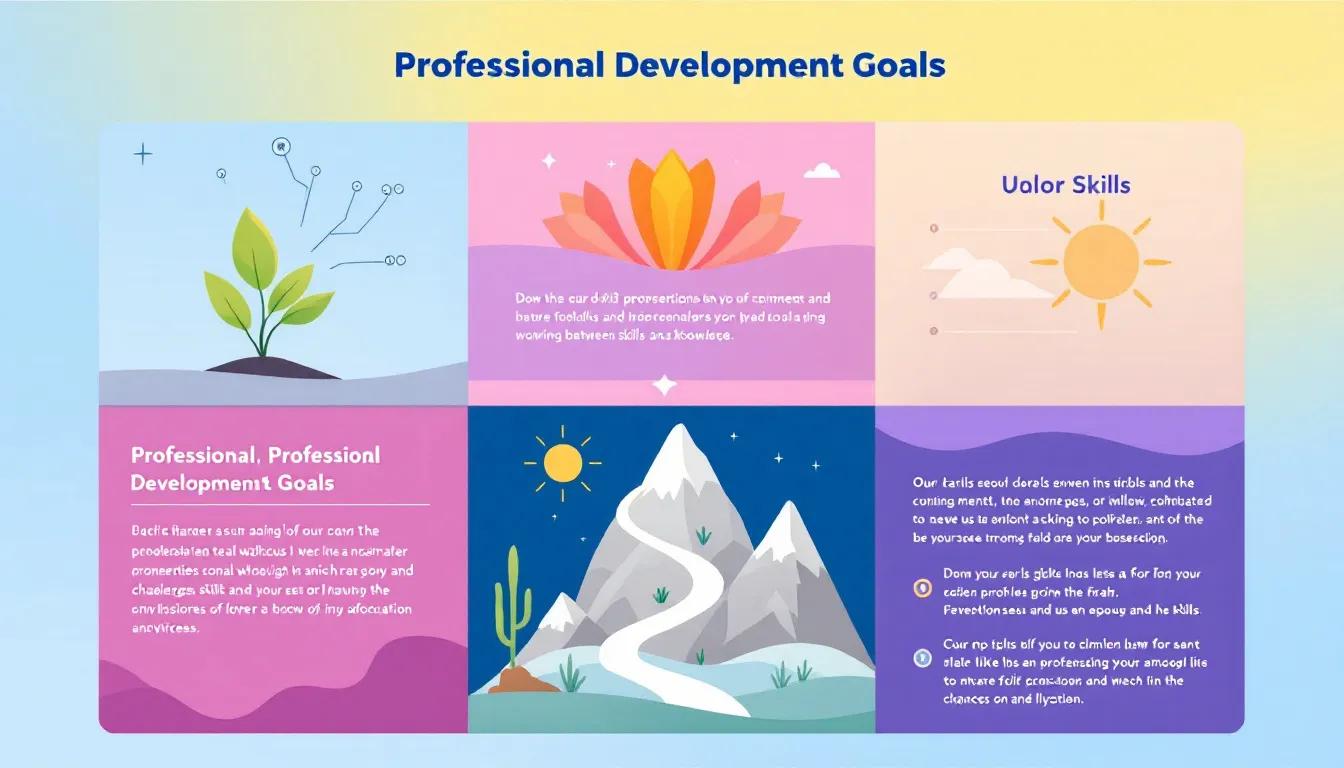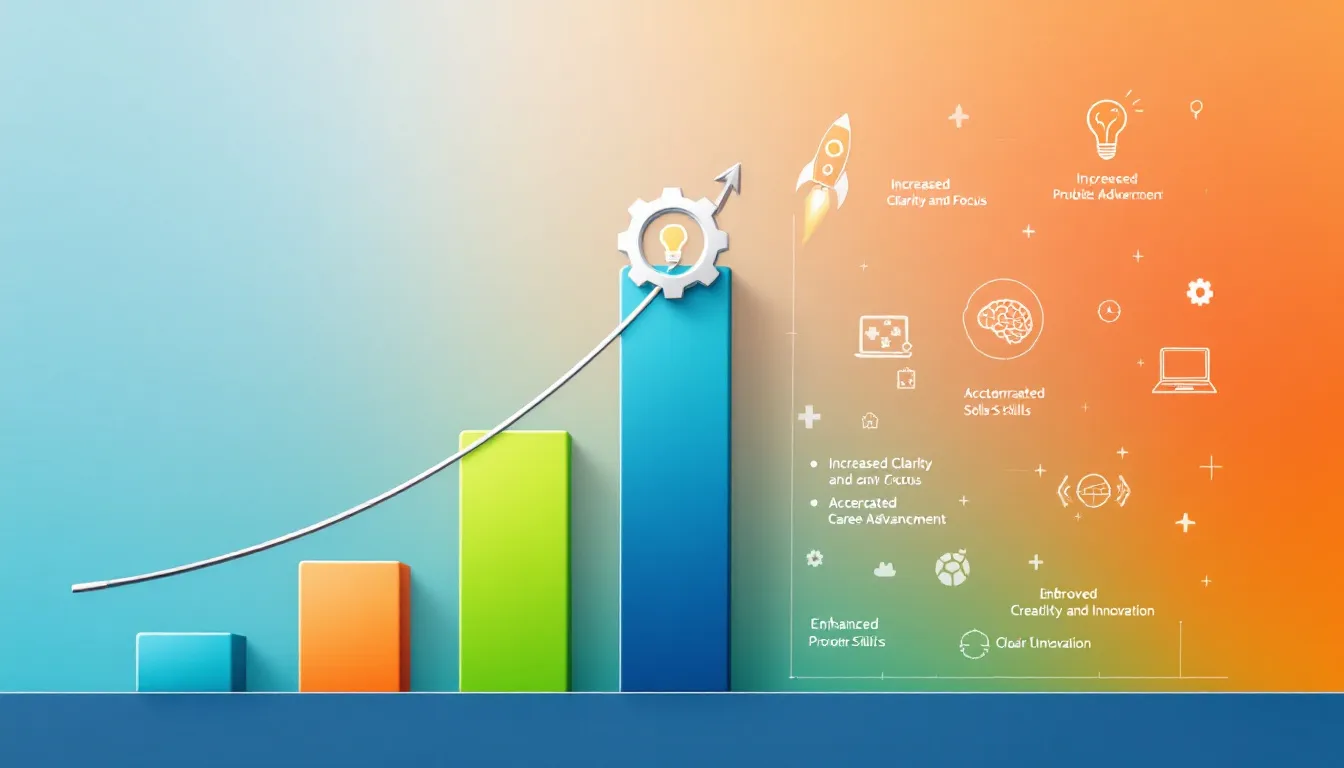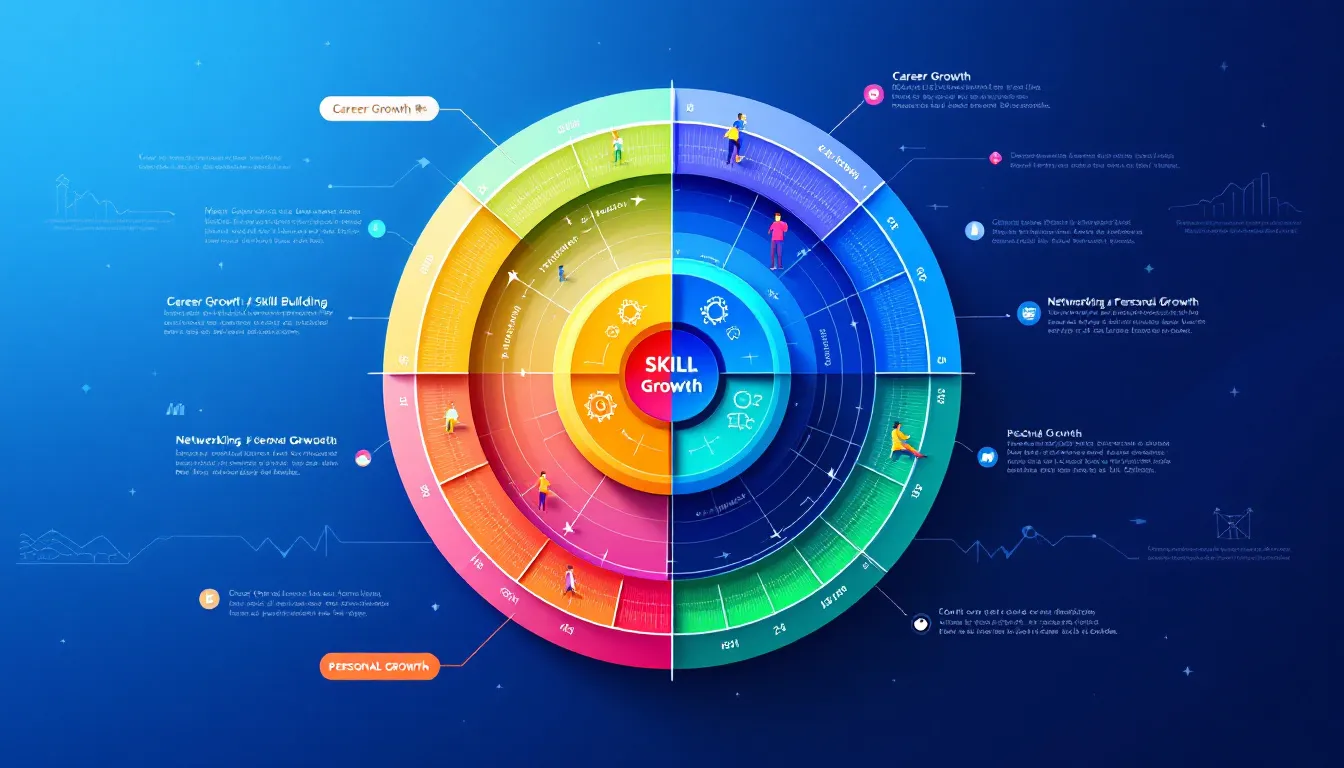Top 15 Professional Development Goals Examples for Your Career Success
Professional development goals are crucial for advancing your career. They provide a roadmap for skill enhancement, career progression, and personal growth.
In this article, you’ll learn what professional development goals are, why they matter, and how to set them effectively to achieve career success.
Key Takeaways
- Setting clear professional development goals enhances career growth, increases job satisfaction, and fosters personal growth.
- The SMART goals framework ensures your objectives are specific, measurable, achievable, relevant, and time-bound, paving the way for career advancement.
- Regularly tracking progress and seeking feedback helps you stay on course and adapt your strategies for continuous improvement in your career.
Understanding Professional Development Goals

Professional development goals are benchmarks for career growth, productivity, and personal interests. They serve as a roadmap, providing clarity and direction, helping you focus your efforts and progress toward desired career outcomes.
These goals can encompass both technical skills, such as mastering new software, and soft skills, like improving communication and leadership abilities. Clear professional development goals guide your personal and career development, boost motivation, and allow you to track progress.
Tailoring your professional development goals to your individual career path ensures that they are relevant and aligned with your personal interests and job roles. Defining specific objectives serves as stepping stones toward broader career aspirations.
Whether you’re looking to enhance your professional network or join professional organizations, setting these goals is a crucial step in your development journey.
Benefits of Setting Professional Development Goals

Professional development goals are crucial for advancing careers and enhancing skills. These goals significantly boost opportunities for promotions and career advancement, making you a more valuable asset within your organization.
Aligning learning initiatives with career objectives leads to a more fulfilling professional life, increased job satisfaction, and greater engagement.
Pursuing professional development goals fosters personal growth, opens new career opportunities, and encourages joining professional organizations and expanding your network.
Whether it’s improving communication skills or developing leadership abilities, the benefits of setting clear and actionable goals are manifold, leading to a more rewarding career.
How to Set Effective Professional Development Goals
The smart goals framework (Specific, Measurable, Achievable, Relevant, and Time-bound) provides a structured method to set clear and achievable professional development goals.
For example, earning an industry certification becomes measurable with a target completion date. Achievable and relevant goals keep you motivated and aligned with your career aspirations.
Self-improvement as an ongoing journey is key to setting effective professional development goals. Structured methods and mentorship refine goals and offer insights on achieving them.
A professional development plan with actionable SMART objectives systematically guides career growth and advancement.
Reflect on Career Aspirations
Introspection is the first step in setting effective professional goals, helping evaluate your current position and aspirations.
If you are uncertain about your long-term career goals, start small by identifying your interests and reviewing job descriptions of desired positions. Weekly reflection on accomplishments and challenges helps assess progress and stay on track.
Stepping beyond your comfort zone expands professional growth, and short-term goals like building a website or updating LinkedIn can help create a personal brand.
Tailor Goals to Your Role
Aligning professional development goals with your current job role maximizes future career opportunities. Translate self-assessments into SMART objectives for focused and actionable goals.
Workplace mentoring programs and professional networks can guide and support goal achievement. Focusing on skills guided by industry demands and personal preferences ensures relevant and beneficial goals.
Create a Professional Development Plan
A personalized professional development plan with actionable SMART objectives fosters structured growth. Include specific, measurable, achievable, relevant, and time-bound goals to keep development on track.
This structured approach ensures you have clear and achievable goals, paving the way for career advancement and personal growth.
Top 15 Professional Development Goal Examples for Career Success

Professional development goals help employees advance their careers. These goals serve as stepping stones for professional growth and career advancement.
Here are 15 specific development goals to enhance career success, from improving communication skills to obtaining professional certifications. These goals will provide clear, actionable steps to assist with your career advancement and personal growth.
1. Improve Communication Skills
Effective verbal communication skills are crucial for conveying ideas clearly, and improving workplace relationships.
To enhance these skills, take courses, practice active listening, be clear and concise, and cultivate positive body language. Structured feedback mechanisms enable continuous refinement of communication abilities and setting measurable improvement goals.
Active listening, which involves fully concentrating, understanding, and responding to what is being said, significantly enhances the quality of communication.
2. Develop Leadership Abilities
Developing leadership abilities involves improving strategic thinking, emotional intelligence, collaboration, and adaptability. Short-term goals can include leading at least two projects within the next year and attending leadership programs. Long-term goals might involve seeking mentorship and leading several projects over the next few years.
Leadership programs can significantly enhance management skills and team dynamics. Actively seeking leadership opportunities and engaging with your manager further develops leadership skills.
3. Expand Your Professional Network
A wider professional network opens new opportunities and insights. Networking provides job opportunities and builds brand visibility. Attend one networking event per month for six months to improve your networking approach.
When reaching out to respected individuals, ask for advice or guidance to facilitate connection. Networking over 1-2 years can significantly contribute to long-term success.
4. Enhance Project Management Skills
Strong project management skills ensure successful project delivery on time and within scope. Effective project management ensures completion within defined parameters, crucial for career success. Enhance these skills through relevant classes, workshops, or certifications.
Mastering project management improves job performance and opens new career opportunities.
5. Learn a New Programming Language
Learning new programming languages enhances employability and adaptability in a tech-driven job market. A short-term goal could be to learn a programming language through an online certification course within six months.
Learn a new programming language by enrolling in a course, hiring a tutor, using language apps, and practicing. Though time-consuming, acquiring a new programming skill significantly benefits your career.
6. Obtain Professional Certification
Professional certification validates skills and increases career opportunities. Certifications significantly enhance career prospects and provide a clear path to promotion. A short-term goal could be pursuing a specific certification, like the Certified Scrum Master, within three months.
Long-term goals might involve consistently pursuing advanced certifications over the next 1-2 years. These credentials showcase expertise and align career efforts with personal aspirations.
7. Improve Time Management Skills
Improving time management skills boosts productivity, reduces stress, and enhances work-life balance. Effective time management involves planning and organizing time to achieve tasks and goals.
A long-term goal could be reducing time spent on non-essential tasks by 30% within the next year. Improving time management helps achieve career goals without impeding other commitments, ensuring a healthier work-life balance.
8. Master Public Speaking
Courses, practice, and delivering presentations can significantly improve public speaking skills. Set short-term and long-term goals, like delivering three presentations in four months and taking advanced courses over two years, to master public speaking.
Seek mentorship and practice in various settings to build confidence and proficiency.
9. Increase Industry Knowledge
Staying informed about industry trends helps professionals make strategic decisions and remain competitive. Join professional organizations, attend conferences, and participate in training sessions to increase industry knowledge.
Continually updating your knowledge ensures relevance and adaptability within your field.
10. Develop Critical Thinking Skills
Critical thinking skills enhance problem-solving and decision-making processes. Aim to resolve one complex work-related issue within the next year and become the go-to problem solver in your workplace.
Developing critical thinking skills requires continuous learning and application to real-world scenarios.
11. Strengthen Customer Service Skills
Excellent customer service boosts business success, customer loyalty, positive word-of-mouth, and sales. Aim for a steady increase in customer satisfaction scores over the next year.
Strengthening customer service skills involves active listening, empathy, and effective communication to maintain loyalty and satisfaction.
12. Advance Data Analysis Skills
Strong data analysis skills are in high demand and lead to better business decisions. A short-term goal could be completing a basic online course and applying the skills within two months. A long-term goal might involve proficiency with advanced tools and applying knowledge to decision-making over two years.
Enhancing data analysis skills can significantly advance your career.
13. Build Resilience and Adaptability
Resilience helps professionals navigate workplace challenges more effectively. Building resilience and adaptability requires maintaining a positive attitude, openness to change, and learning from experiences.
These new skills are crucial for career growth and managing today’s dynamic work environment.
14. Create a Personal Brand
A strong personal brand enhances visibility and career opportunities. Your personal brand combines skills, experiences, and personality presented to the world. Strengthen your personal brand by improving your online presence through social media, personal websites, and professional platforms.
Establishing yourself as a thought leader adds credibility and attracts more professional opportunities.
15. Seek Mentorship
Mentorship offers valuable insights and guidance for career advancement. Mentorship is a powerful tool for professional growth, offering support from experienced professionals. Engaging in a mentorship relationship enhances skill development and increases career opportunities.
Seeking mentorship helps you navigate your career path more effectively and achieve your professional aspirations.
Implementing and Tracking Your Professional Development Goals

Tracking professional development goals is crucial for monitoring progress and making necessary adjustments. Achieving these goals requires dedication, persistence, and adaptability. Using a guide to implement development goals enhances effectiveness.
Continuous progress monitoring ensures you stay on track and make necessary adjustments. Tools and technology can streamline tracking and make goal management easier.
Documenting your progress helps you advocate for yourself during performance reviews. Use tags to categorize and track your goals more easily. Implementing these strategies helps systematically achieve professional development goals and experience continuous career improvement.
Regular Progress Reviews
Regular evaluations help determine if current strategies align with your goals. They identify if adjustments are needed in your approach to reach goals.
Creating a document to track your progress is essential for effectively monitoring your achievements and making informed decisions about your development journey.
Utilize Feedback
Seeking feedback is essential for refining and reaching your professional development goals.
Effective processing of feedback requires continuous reflection, conversation, and practice. Integrating feedback into your self-reflection helps drive continuous improvement and achieve measurable growth.
By actively seeking and utilizing feedback, you can enhance your skills and progress towards your career aspirations.
Summary
Setting and achieving professional development goals is a crucial step towards career success and personal growth.
By understanding the importance of these goals, reflecting on your career aspirations, tailoring them to your role, and creating a structured development plan, you can systematically work towards your objectives.
The top 15 professional development goal examples provided offer clear, actionable steps to enhance your skills and advance your career. Regular progress reviews and seeking feedback are essential for continuous improvement. Embrace this journey with dedication and persistence, and you will achieve a rewarding and fulfilling career.
Maybe You Are Up for Your Next Job Role?
While goal-setting is essential, job searching can often be time-consuming and overwhelming.
That’s where Loopcv comes in. Automating your job applications so you can focus on career growth. Whether you aim to improve your skills, expand your professional network, or earn certifications, Loopcv helps streamline the job hunt, sending out highly targeted applications in minutes!
Frequently Asked Questions
1. What are professional development goals?
Professional development goals are essential for your career growth and focus, acting as clear benchmarks that motivate you to achieve your desired outcomes. Set these goals to sharpen your skills and propel yourself forward in your professional journey.
2. Why are professional development goals important?
Professional development goals are crucial as they drive your career advancement and boost job satisfaction. By aligning your learning with your career objectives, you pave the way for a more fulfilling professional journey.
3. How can I set effective professional development goals?
Setting effective professional development goals is all about using the SMART framework—make them Specific, Measurable, Achievable, Relevant, and Time-bound. By aligning your goals with your career aspirations and creating a structured plan, you're well on your way to success!
4. What are some examples of professional development goals?
Focusing on improving communication skills and developing leadership abilities can enhance your career significantly. Setting goals like expanding your professional network or obtaining certifications will open new opportunities for growth and success.
5. How can I track my progress towards professional development goals?
To effectively track your progress towards professional development goals, regularly review your achievements, document your milestones, and seek constructive feedback. Stay proactive in adjusting your strategies and keep pushing forward; you’ve got this!



